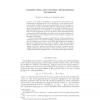Free Online Productivity Tools
i2Speak
i2Symbol
i2OCR
iTex2Img
iWeb2Print
iWeb2Shot
i2Type
iPdf2Split
iPdf2Merge
i2Bopomofo
i2Arabic
i2Style
i2Image
i2PDF
iLatex2Rtf
Sci2ools
124
click to vote
JCB
1998
1998
Constructing and Counting Phylogenetic Invariants
Abstract. The method of invariants is an approach to the problem of reconstructing the phylogenetic tree of a collection of m taxa using nucleotide sequence data. Models for the respective probabilities of the 4m possible vectors of bases at a given site will have unknown parameters that describe the random mechanism by which substitution occurs along the branches of a putative phylogenetic tree. An invariant is a polynomial in these probabilities that, for a given phylogeny, is zero for all choices of the substitution mechanismparameters. If theinvariantistypicallynon zerofor anotherphylogenetic tree, then estimates of the invariant can be used as evidence to support one phylogeny over another. Previous work of Evans and Speed showed that, for certain commonlyused substitution models, the problem of nding a minimal generating set for the ideal of invariants can be reduced to the linear algebra problem of nding a basis for a certain lattice
that is, a free Z-module
. They also conject...
| Added | 22 Dec 2010 |
| Updated | 22 Dec 2010 |
| Type | Journal |
| Year | 1998 |
| Where | JCB |
| Authors | Steven N. Evans, Xiaowen Zhou |
Comments (0)

